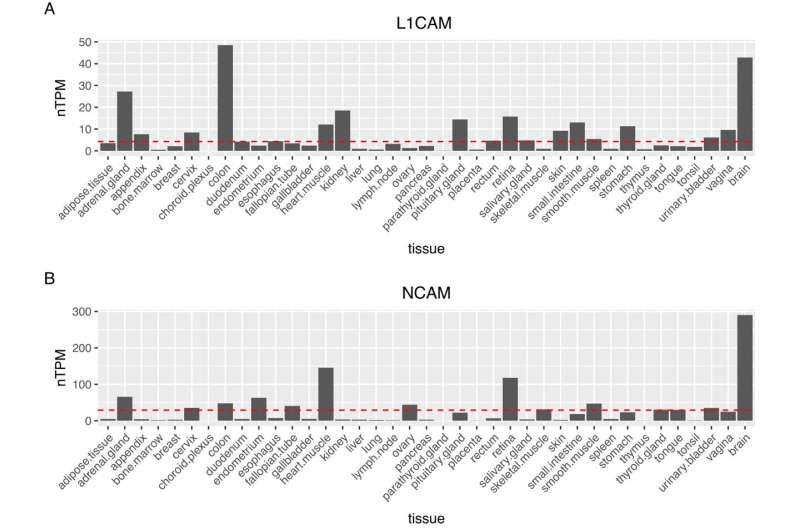This article has been reviewed according to Science X's editorial process and policies. Editors have highlighted the following attributes while ensuring the content's credibility:
fact-checked
trusted source
proofread
Progress toward developing blood tests for psychiatric and neurological disorders

Researchers in a Johns Hopkins Children's Center-led study that used genetic material from human blood and lab-grown brain cells say they have made progress in developing a blood test to identify disease-associated changes in the brain specifically linked to postpartum depression and other psychiatric and neurological disorders.
The research findings, published Jan. 11 in Molecular Psychiatry, focused on identifying the "footprints" of brain cell-derived mRNAs in blood circulating outside the brain. These blood extracellular vesicles carry brain-specific pieces of genetic material that potentially allow researchers to detect disease-associated changes in gene activity inside the brain.
Extracellular vesicles (EVs), fatty sacs of genetic material essential to communication among cells, carry messenger RNA (mRNA) and are released by every tissue in the body, including the brain.
The new research was inspired, investigators say, by results of a study published in September 2022, in which Johns Hopkins Medicine scientists discovered EV communication is altered in pregnant women who go on to develop postpartum depression after giving birth.
"We only detected placenta-specific EVs during the pregnancy and not after birth. This was a proof of concept that we can detect EVs that are coming from a specific tissue or organ," explains Sarven Sabunciyan, Ph.D., an assistant professor of pediatrics at the Johns Hopkins University School of Medicine and the paper's senior author.
First, using the human placenta as a model, the investigators identified 26 placental mRNAs that are present in maternal blood only during pregnancy and not following birth, proving that mRNAs from specific tissues are found in EVs in circulating blood.
Then, using lab-grown human brain tissue derived from stem cells (brain organoids), researchers found that EV mRNAs that are released from these brain tissues reflected the changes occurring inside the tissues. Sabunciyan and his team conclude that it is possible to gather biological information about normally inaccessible tissues, such as the placenta and the brain, by examining EV mRNAs circulating in the blood.
They were able to identify mRNAs that are specifically expressed in the brain using data from the Human Protein Atlas—a Swedish-based database of human proteins in cells, tissues, and organs—and the Genotype-Tissue Expression Project, which has extensively cataloged mRNA levels in human tissues.
Further analysis of those mRNA genetic pathways showed that the brain-specific mRNAs in blood EVs were involved in particular brain functions and were significantly enriched for genes already associated with brain disorders that involve mood, schizophrenia, epilepsy, and substance abuse.
The research team says this analysis suggests that these mRNAs are likely to be ideal biological markers for identifying such conditions.
"This is very exciting because right now, there isn't a blood marker for disorders affecting the brain, says Lena Smirnova, Ph.D., an assistant professor in the Department of Environmental Health and Engineering at the Johns Hopkins Bloomberg School of Public Health and co-author of the paper. Essentially, these conditions are diagnosed by clinical interviews between patients and providers."
Researchers also discovered 13 brain-specific mRNAs in the blood that were found to be associated with postpartum depression. To determine the extent to which blood EV mRNAs reflect transcription in the brain, researchers compared mRNAs isolated from cells and EVs in a brain organoid model. They found that although cellular and extracellular mRNA levels are not identical, they do correlate, and it is possible to extrapolate cellular expression changes in the brain via EV mRNA levels.
The goal is to develop a simple blood test to detect changes such as higher or lower levels of blood EV mRNAs directly linked to changes in the brain associated with mental disorders without having access to the brain itself, says Sabunciyan.
Eventually, Sabunciyan adds, the availability of such blood tests could enable detection of early signs of mental health emergencies, such as suicidal behavior. The ability to identify patients who are at risk of having a psychiatric episode would enable the care team to intervene and possibly prevent negative outcomes.
In future studies, they plan to use lab-grown brain samples to identify similar biomarkers to develop tests for autism spectrum disorder.
The researchers caution that the differences identified with respect to depression may be linked only to postpartum depression because the study was conducted using samples only from female participants.
More information: Lena Smirnova et al, Blood extracellular vesicles carrying brain-specific mRNAs are potential biomarkers for detecting gene expression changes in the female brain, Molecular Psychiatry (2024). DOI: 10.1038/s41380-023-02384-6




















